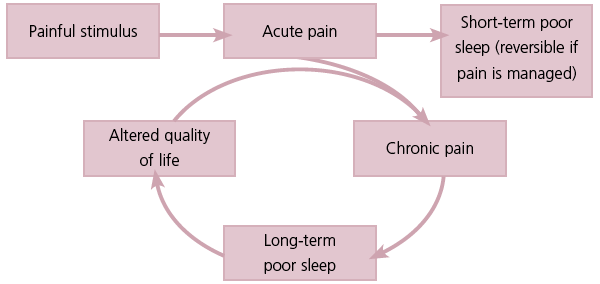| Q: |
What is pain?
| | A: |
Pain, as defined by the International Association for the Study
of Pain, is an “unpleasant sensory and emotional experience associated
with actual or potential tissue damage or described in terms of such
damage.”
|
| Q: |
What is acute pain?
| | A: |
Acute pain is pain that is typically short-lasting, where relief
is readily available and, if properly treated, it may not result in a
long-term negative impact on quality of life or health. An example of
acute pain is a toothache or wound pain after an operation.
|
| Q: |
What is chronic pain?
| | A: |
Chronic pain is longer lasting. If pain lasts weeks to months and
cannot be controlled, it can result in poor quality of life and
impairment of day-to-day activities, work performance, and
relationships. If the emotional and mood aspects of chronic pain are not
appropriately managed, severe problems can result as well.
|
| Q: |
How does pain disrupt sleep?
| | A: |
Pain that occurs acutely (such as wound pain immediately after
surgery, angina, or a severe toothache) can disrupt sleep by delaying
sleep onset, causing awakening from sleep or poor sleep quality.
However, this type of pain is usually short-term and once treated, the
effects on sleep are immediately reversible. Chronic pain, even if
low-grade and long-lasting, can lead to a vicious cycle
where sleep is disrupted leading to poor sleep and increased pain
sensitivity the next day. This cycle then continues and affects mood,
energy, behavior, and one’s general safety during the day.
|
| Q: |
How common is poor sleep in chronic pain?
| | A: |
It is estimated that up to 1 in 4 adults experience chronic pain,
and that more than half of these people experience sleep disturbances
irrespective of what is causing the pain.
|
| Q: |
What other types of sleep disruption, apart from insomnia, occur in chronic pain?
| | A: |
Apart from insomnia, chronic pain sufferers can experience
nightmares, periodic limb movements, sleep apnea, sweating, and heart
palpitations. Patients on high levels of morphine or related analgesics
can have breathing pauses at the start of sleep related to instability
of the respiratory centers in the brain.
|
| Q: |
What causes sleep disruption in chronic pain?
| | A: |
Chronic pain results in sleep fragmentation and arousals leading
to poor quality, unrefreshing sleep. Sleep fragmentation can result in
an absolute increase in stage 1 and stage 2 sleep in relation to the
other stages of sleep. This means that there is less slow wave sleep
which is considered restorative to physical processes. People with
chronic pain also experience many microawakenings during the night
related to body movement. There also appears to be overactivation of the
sympathetic nervous system in people with chronic pain, which leads to
increased anxiety, and problems with maintaining and initiating sleep,
leading to insomnia.
|
| Q: |
What are the daytime symptoms in chronic pain?
| | A: |
Poorly controlled pain and poor sleep can lead to fatigue,
excessive sleepiness during the day, headaches, sleepiness while
driving, anxiety, anger, and frustration.
|
| Q: |
How are sleep problems in chronic pain treated?
| | A: |
Control of pain and any associated mood disorder is the key to
treating sleep disturbances in chronic pain. Your doctor should use an
incremental and multipronged approach. This includes determining whether
you might have a primary sleep disorder and reviewing sleep hygiene issues with you . Your doctor will also work out whether talking therapies, such as cognitive-behavioral therapy,
or physical therapies, such as massage or TENS, might be useful. Your
doctor may then try medication, nerve blocks, and other ways to control
pain. There are many medications that can be used for both treating pain
and inducing sleep and these must be tested under medical supervision.
Treatment of chronic pain is complex and referral to a chronic pain
specialist or clinic is advisable.
|
The vicious cycle of pain
Acute pain can lead to poor
sleep in the short term, but this is reversible as long as the
individual returns to having good sleep or manages the pain so that
sleep is unaffected. If the pain becomes chronic, however, and affects
sleep in the longer term, it can lead to a vicious cycle: lack of sleep
makes the pain more intense and this in turn disturbs sleep.

|